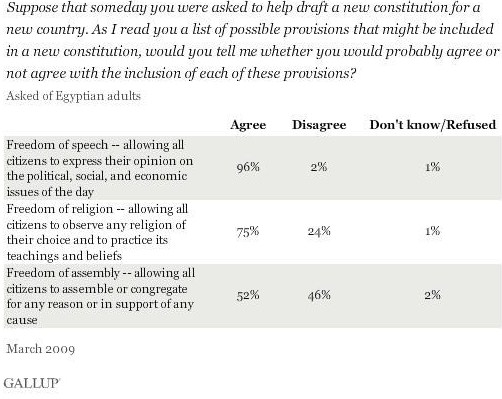One of the key questions in assessing the likelihood of public support for democracy is the willingness of people to tolerate religious differences. Such tolerance includes the freedom of an individual to choose which religion he or she decides to practice.
Making that assessment in Egypt, however, appears somewhat elusive. In March 2009, Gallup polled a representative sample of Egyptians and reports that the vast majority support freedom of religion “in theory,” while a Pew poll of Egyptians in April 2010 found an overwhelming majority of Muslims (who constitute 90% of the Egyptian population) seemingly opposed.
I say “seemingly” because the wording of the Pew question does not ask specifically about the principle of freedom of religion, as does Gallup’s question, but rather whether respondents wanted to make it a capital offense to leave the Muslim religion – which would suggest, by inference, quite limited freedom of religion.
The two pollsters’ questions are shown below:
 |
The findings of these two polls appear as different as night and day.
Part of the difference is that Gallup reports on the whole population, while Pew reports on just the Muslim population (90% of the total). But even if we adjusted Pew figures to represent the whole Egyptian population (by assuming that all non-Muslims would oppose the death penalty for Muslims leaving their religion), the net figures would still show that about three quarters of all Egyptians favor that harsh punishment.
That’s about a 3-to-1 margin against “freedom of religion” (or at least “freedom to choose religion”), while Gallup’s results show about a 3-to-1 margin in favor of “freedom of religion.”
There is another difference that may account a little for the seemingly contradictory findings of the two polls: Gallup asks respondents their views about freedom of religion as it applies, theoretically, to a “new country,” while Pew asks specifically whether respondents want the death penalty law for Egypt.
I’m skeptical, however, that this theoretical vs. real-life application accounts for the reversal of majority opinion. I would assume that when people are talking “theoretically” about what would be best for a “new” country, they are probably reflecting what would be ideal for their own country.
There’s no way to prove that assumption, of course, but I suspect it was the reason Gallup asked the question that way.
 |
| Gallup’s March 2009 poll. (Credit: Gallup) |
Finally, it would be hard to argue that the one-year difference in the timing of the polls (2009 vs. 2010) could account for what would be a sea-change in the Egyptian culture.
If we accepted timing as the cause of the differences, we would be saying that Egypt changed from a religiously tolerant country in 2009 to a religiously restricted country a year later. This hardly seems likely.
My hypothesis to explain the differences in the polls (which can be tested in some future surveys) is that the concept of “freedom of religion,” just as the concept of “democracy,” may mean quite different things to Muslims from what Westerners might take for granted. (See a related post here.)
For many of Gallup’s respondents, freedom of religion may mean that Muslims and Christian and Jews and people of other religions should all be able to live together and not be discriminated against because of their religious beliefs. But at the same time, people who are already Muslim cannot leave the faith without being an apostate – a person who has renounced the true faith to which he/she has been exposed and thus has committed an unforgiveable transgression (worthy of the death penalty).
It’s a similar argument devout Christians make – that it’s worse for a person who has been baptized and raised in the faith to reject Christ than it is for someone without that background not to be a Christian.
In one case, Christ (or Islam) is specifically rejected. In the other case, the person can be tolerated (or forgiven) for being a non-believer simply because of his or her ignorance or lack of appropriate religious upbringing.
Thus, “freedom of religion” may mean that it’s good for people of various religions to live together, but it’s still not acceptable for people to leave their faith for another (or for no faith) – especially (among Muslims) if they are Muslim initially.
Whatever the actual explanation for the differences between Gallup and Pew, the apparently contradictory results suggest how important it is not to take poll results too literally.
This caveat is especially relevant when polls are conducted in foreign languages and foreign cultures. It’s not only that words, when translated, can conjure up quite different meanings from what the pollster intends, but that the concepts themselves may mean something quite different in the other culture from what it means in the culture where it originated.
Measuring “freedom of religion” is more complicated than simply asking people whether they support the concept.
Pollsters would be better advised to ask several specific questions, to explore what people believe about the rights of citizens to accept or reject any religion they choose, regardless of their childhood upbringing or later conversion.
Without the more in-depth questioning, the poll results are as likely to mislead us about public opinion as they are to enlighten us.
David W. Moore is a Senior Fellow with the Carsey Institute at the University of New Hampshire. He is a former Vice President of the Gallup Organization and was a senior editor with the Gallup Poll for thirteen years. He is author of The Opinion Makers: An Insider Exposes the Truth Behind the Polls (Beacon, 2008; trade paperback edition, 2009). Publishers’ Weekly refers to it as a “succinct and damning critique…Keen and witty throughout.”






